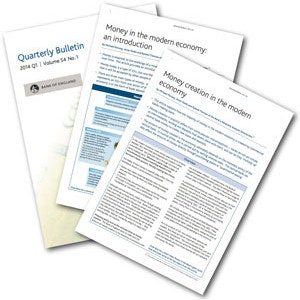How Money Gets Destroyed [Banking 101 Part 6]
Remember how new money is created when a bank makes a loan? Well, when someone repays the loan, the opposite process happens, and money is actually destroyed.
Remember how new money is created when a bank makes a loan? Well, when someone repays the loan, the opposite process happens, and money is actually destroyed. It effectively disappears from the economy entirely. This video explains how.

Proof & Further Reading:

Money is destroyed when loans are repaid:
From the Bank of England’s 2014 Q1 Quarterly Bulletin:
“Just as taking out a new loan creates money, the repayment of bank loans destroys money. For example, suppose a consumer has spent money in the supermarket throughout the month by using a credit card. Each purchase made using the credit card will have increased the outstanding loans on the consumer’s balance sheet and the deposits on the supermarket’s balance sheet. … If the consumer were then to pay their credit card bill in full at the end of the month, its bank would reduce the amount of deposits in the consumer’s account by the value of the credit card bill, thus destroying all of the newly created money.
“Banks making loans and consumers repaying them are the most significant ways in which bank deposits are created and destroyed in the modern economy.” (McLeay, Thomas, & Radia, Money creation in the modern economy, page 3)
Transcript
This is vitally important because it means that if we, the public, start reducing our debts by collectively borrowing less and repaying more, then the amount of money in the economy will actually start to shrink.
If we all collectively reduced our debts by £1billion, then the money supply of the economy will actually fall by £1billion. There will be £1billion less money changing hands in the economy.
If we significantly reduce the debt then the shrinkage in the money supply could actually cause the economy to slow down or grind to a halt. Just think of the problems caused when banks refused to lend during the credit crunch.
So although we all think it’s a good idea to get out of debt, and most of us are trying to get out of debt, as long as we keep the current system it will be impossible to reduce our collective debt without slowing down and potentially destroying the economy.
So let's see exactly how money is destroyed when a loan is repaidLet’s start with Robert, who still owes £10,000 to Barclays but has spent the money, leaving his bank balance at zero.
BARCLAYS BANK BALANCE SHEET (Step 1)
(left side): Assets
(What the borrowers owe to bank + bank’s money)
(right side): Liabilities
(What the bank owes to the depositors + bank’s net worth)
(left side): Loan to Robert: +£10,000
(right side): Robert’s account: £0
After a few months, Robert decides to pay down £1000 of the loan. He transfers the money from a bank account with another bank, to his bank account at Barclays.
We won’t show the central bank reserves on this process because, as we saw with the clearing process, any change in the reserves would probably be cancelled out by payments going in the opposite direction, and won’t change things in any significant way.
Now Robert still owes £10,000 to Barclays, but also has an account with Barclays that now has a balance of £1000.
As a result, Barclays has a liability to Robert of £1000 – that’s the numbers in Robert’s bank balance – and Robert has a liability to Barclays of £10,000.
When Robert called Barclays and says that he wants to pay off £1,000 of the loan, all Barclays does is reduce Robert’s bank balance to zero, and reduce the outstanding loan by £1,000.
In effect, both the asset and the liability are cancelled out against each other.
BARCLAYS BANK BALANCE SHEET (Step 2)
Assets
(What the borrowers owe to bank + bank’s money)
Liabilities
(What the bank owes to the depositors + bank’s net worth)
Loan to Robert: +£10,000
Robert’s account: £1000
Repaying loans reduces the amount of money in the economyBecause the money supply in the hands of the public is made up of bank-created numbers in people’s bank accounts, repaying loans in this way actually reduces the amount of money in the economy. Money – the type of money that the public use – has been destroyed in the act of repaying the loan.
Of course, now that Robert’s loan has been partly repaid, Barclays might go hunting for another lending opportunity, and make a new loan to replace this, in which case new money will be created and the money supply will grow again. But if banks are scared to lending, for example following a major financial crisis, and the public are trying to reduce their debts, then the money supply of the economy will shrink.
Here it is in the simplest formIf we want more money in the economy, we need to go into more debt.
And if we want less debt in the economy, we have to have less money.